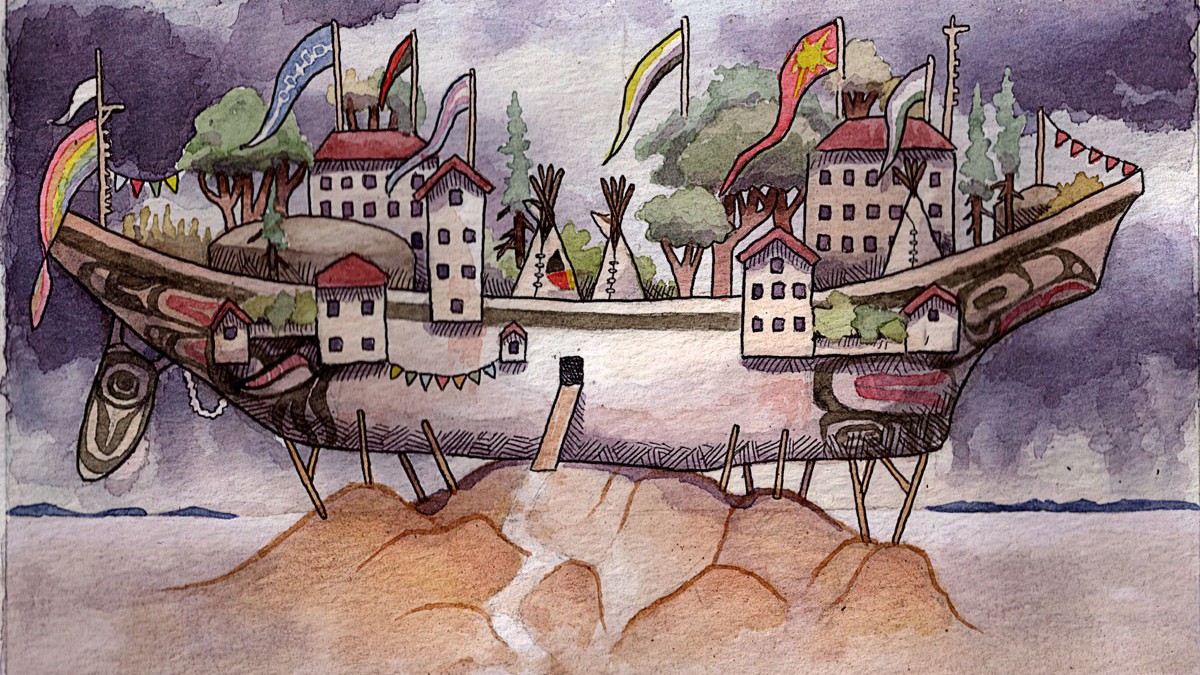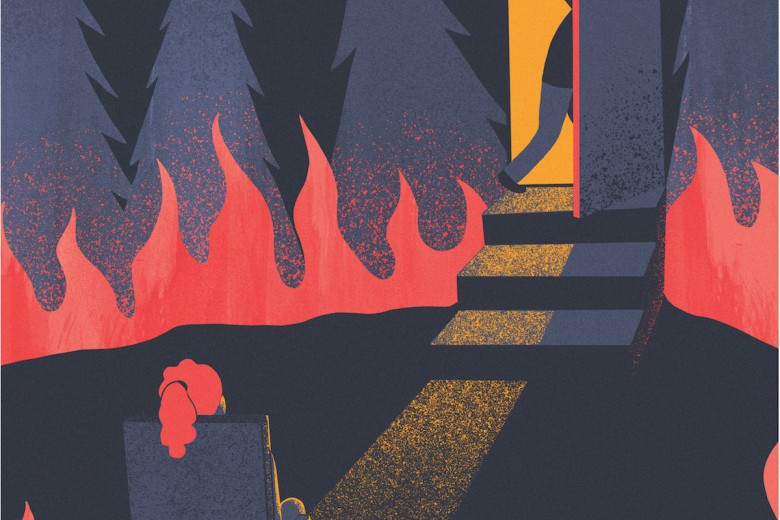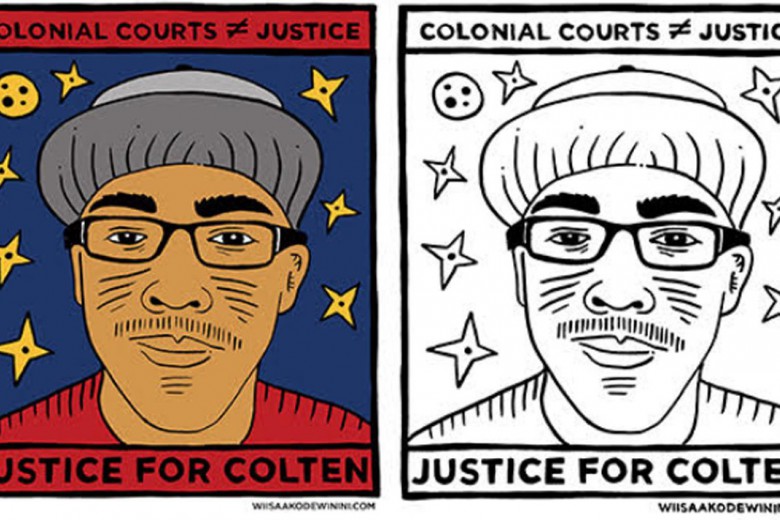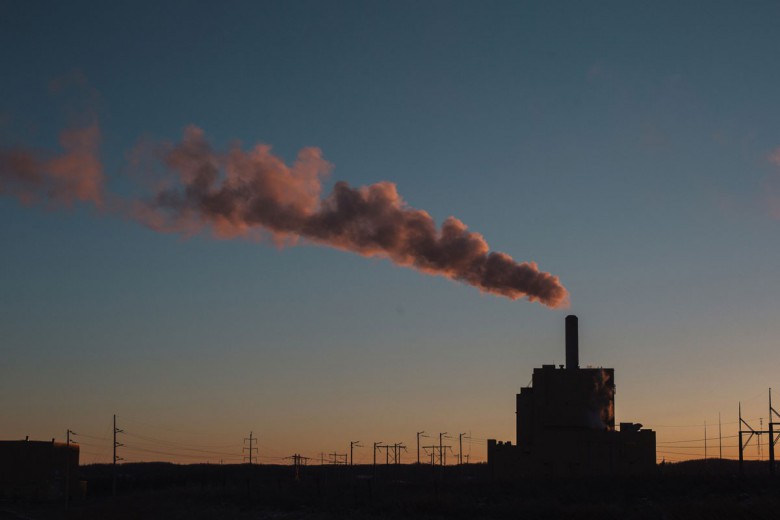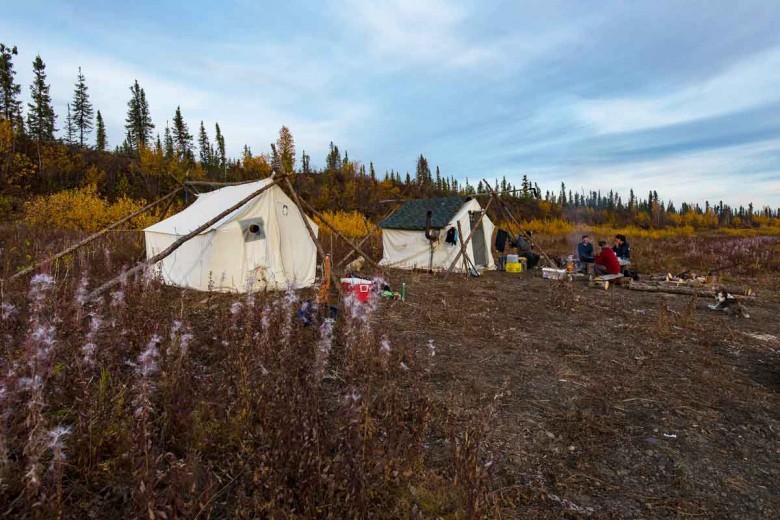Myriad Augustine doesn’t look anything like the doomsday preppers you’d see on reality TV. When I walk into their workshop, they’re holding a mobility cane and wearing a T-shirt that reads “Low Femme Weirdo.” In their early 30s, the Toronto resident invokes a casual, sardonic humour as we discuss potential scenarios that could end or seriously alter our lives in a future marked by climate change – from floods to fire to scarcity of food and potable water.
Myriad started teaching the GOAT (Get Out Alive, Together!) workshop series in Toronto in 2016, in response to the overwhelming number of people teaching survival and disaster-preparedness skills from a right-wing, individualist perspective. GOAT is rooted in principles of mutual aid and collaboration, with a focus on marginalized identities – centring the people who mainstream disaster narratives often paint out of the picture, portray as a threat, or assume would succumb to the Darwinian logic of “survival of the fittest.”
“The first thing I say [when I teach] is that literally no one is able to survive day to day without relying on someone else – why do we assume we can do this when everything is falling apart?”
“I identify as ‘multiply marginalized,’ which is a simple way to say a very complicated thing,” Myriad explains to me. “I’m PoC [a person of colour], I’m mixed-Black, I’m from a low-income family. I have mobility issues and chronic pain, as well as obsessive-compulsive and anxiety disorders.” By virtue of these things, they explain, even the decision to leave the house involves risks ranging from physically inaccessible infrastructure to harassment from police.
GOAT discussions can range from how to make homemade insulin if pharmacies shut down, to how to evacuate from Toronto if roads are closed, to how to navigate interpersonal conflicts when the survival of a group is at stake. Myriad explains, “The first thing I say [when I teach] is that literally no one is able to survive day to day without relying on someone else – why do we assume we can do this when everything is falling apart?”
“We are the ones we have been waiting for”
“Doomsday prepper” and “survivalist” narratives tend to feature a lone white man with an automatic rifle defending his family against groups of fictionalized aggressors – be they racialized migrants, “street gangs,” or vague and alarmist conceptions of “the left.” Survivalist websites and message boards are peppered with references to masses of “starving people knocking on your door” who are “trying to take what you have” (these quotes are from skilledsurvival.com, a prepper website run by a “patriot” Colorado man who calls himself “Just In Case” Jack). The far right has found an eager audience in prepper communities by promoting fears of white, heterosexual existence dissolving under the tyranny of decolonial, anti-racist, and LGBTQ2S movements. “There is absolutely nothing that will save us. […S]tock up on weapons and ammo and protect your family when they come to slaughter you,” reads a tweet from one right-wing survivalist account in response to a Confederate statue being vandalized.
“What these preppers are preparing for is a fantasy where they are no longer beholden to the expectations of others, but also capable of individually replicating all of the functions of a society that they take for granted,” says Myriad. Mainstream prepper culture began during the anti-communist fear-mongering of the Cold War – but survival-oriented communities of queer, racialized, and disabled people have always existed. After Hurricane Katrina hit New Orleans, it was the Common Ground Collective, founded by anarchist organizer scott crow, former Black Panther Party member Malik Rahim, and community activist Sharon Johnson, that provided vital disaster relief – food, shelter, and medical care – to New Orleans’ primarily Black residents when the state failed to do so.
“What these preppers are preparing for is a fantasy where they are no longer beholden to the expectations of others, but also capable of individually replicating all of the functions of a society that they take for granted.”
Historically, the disaster relief offered by states and corporations has been a Trojan Horse for Western military and economic interventions that purport to “solve” the crises that they themselves had a hand in creating. For example, after Hurricanes Irma and Maria ripped through U.S.-occupied Puerto Rico, the U.S. Federal Emergency Management Agency failed to distribute 10 million bottles of drinking water, instead leaving them to spoil in the sun. They said the supplies were “excess” and justified their decision by arguing that “commerce was coming back” to Puerto Rico and officials “didn’t want to injure the economy more than it already was.” The cherry on top of the cake was the ruthless austerity measures imposed by the colonial government – closing public schools, slashing vacation days – that aimed to ensure that Puerto Rican people would still pay back their debt to the U.S. while recovering from the disaster.
When we begin to understand that the state will not protect us – or, at least, not the marginalized among us – we can instead become aware of our profound responsibility to our fellow people and to the non-human life around us – in the words of late poet June Jordan, “We are the ones we have been waiting for.” The anarchist idea of mutual aid is one way that marginalized communities take care of each other through co-operation, not competition. The Big Door Brigade, a Seattle-based group of organizers, defines mutual aid as “people giving each other needed material support, trying to resist the control dynamics, hierarchies and system-affirming, oppressive arrangements of charity and social services. Mutual aid projects are a form of political participation in which people take responsibility for caring for one another and changing political conditions, not just through symbolic acts or putting pressure on their representatives in government, but by actually building new social relations that are more survivable.”
It will be poor and racialized communities – living in ghettoized areas, in structurally compromised homes, in food deserts without access to clean water – that will be hit the hardest by climate disaster.
As the climate crisis closes in, we’re looking at a future of rising sea levels swallowing coastal cities, droughts and wildfires ravaging Prairie regions, increased spread of viral and infectious diseases, an uptick in hurricanes and storms, and widespread food insecurity and climate-related poverty. For many in the Global South, the climate disaster already has a mounting death toll.
We know that as natural disasters intensify, disaster relief will be privatized – like when Kim Kardashian West and Kanye West used private firefighters to protect their $50 million Calabasas mansion from the California wildfires while lesser homes burned. The ultra-rich are already equipped with ritzy bunkers, getaway helicopters, and luxury off-grid survival communities.
It will be poor and racialized communities – living in ghettoized areas, in structurally compromised homes, in food deserts without access to clean water – that will be hit the hardest by climate disaster. But there are more of us than there are of them, and mutual aid is our best bet to survive, together.
“We’re used to not having the world built for us”
Kitty Stryker, who describes herself as “a Juggalo anthropologist and an anarchist cat mom prepping a doomsday bunker in the East Bay,” says her parents were “keen on various homesteading practices, from beekeeping, [to] preserving food and baking bread from scratch.”
“As an anxious child, I was also always very aware of what to do if there was a fire in the house. As I became an anxious adult and moved to a place with earthquakes, I began to expand my training and education into bugging out/bugging in [survivalist terms for evacuating to a secured location, and barricading oneself with supplies inside the home], medic care, and other skills like foraging in an urban setting or making your own medicines,” Kitty explains. “Realizing how few people I knew were actually prepared for a disaster put a fire under my ass to be ready – not just for my own sake, but for those around me.”
According to Myriad, oppressed populations generally possess skills and knowledge that may be more practical in survival situations than an expensive bug-out kit or a year’s supply of ammunition. “All marginalized people, by nature of our continued existence in societies that oppress and exploit us, possess numerous survival skills applicable to a disaster situation. Folks with disabilities, specifically, are the original and best ‘lifehackers’ – every single person I know with a chronic health, mobility, and/or psychiatric issue of any kind has created adaptive tools using [the] materials at their disposal and navigated emotional crises that more privileged people have never experienced. There’s also a certain problem-solving shorthand that I have observed when folks with different experiences of disability get together – we might not all know what each of us needs, but we can usually express those needs quickly and spend more time on working to meet them than on whether they’re valid or important.”
“Realizing how few people I knew were actually prepared for a disaster put a fire under my ass to be ready – not just for my own sake, but for those around me.”
Kitty echoes this sentiment. “[People with disabilities] are used to not having the world built for us, so I don’t feel like we’ll crumble as easily when resources are scarce. We’re used to reaching out to each other and balancing needs. It’s messed up that we have so much experience with that, but it would probably be helpful in a survival situation – we’re struggling to survive all the time!”
“I feel there’s a lot of attention paid to caring for yourself and your immediate family, but that ignores those around you, like neighbours, who may not be able to care for themselves. I’d like to see more focus on mutual aid and how to establish care for a group of people in an emergency,” she adds. “There’s so much focus on weapons and self-reliance, but a lot of folks will be in an urban setting and not able [or] willing to run off to the woods. We need more resources for them – I mean us; I’m one of those people!”
“There is so much latent strength in communities of disability when we rely on each other to survive with each other,” says Jim, an autistic trans man with disabilities who is mixed-race Indigenous. (Jim asked that we use only his first name, for privacy.) “Able-bodied people who have the choice to go it alone without consequence, or who have wealth and influence or access to resources that enable them to make it on their own – it’s a choice for them to do this work [of prepping], not a necessity. We rarely learn hard lessons voluntarily.”
“‘Back to the land’? Whose land, again?”
“I think survival has meant, and can mean, a lot of different strategies that are shaped by the choices we have and don’t have,” Jim tells me. Jim’s everyday prepping practices range from chopping firewood to growing, canning, and preserving food – but he says his prepping also looks like doing the work of community building, which he sees as instrumental to decolonization.
“I grew up in a small town, disconnected from Indigenous community and my mom’s family, who are Algonquin,” he tells me. “[My mother’s family] ‘passed’ as French because they were mixed, and my Mamère didn’t speak Algonquin around her children so they never learned. There was a very real threat of being taken away to residential schools, and of everyday racist violence from white folks, so as my Uncle Clem said, ‘We didn’t talk about being Indians.’ That was how they survived.”
It was a long time before Jim understood that his family hiding their Indigeneity is a was a matter of survival. “That was the only choice they had as Algonquins who were non-status and were barred by the Canadian government from living on reserve. Assimilation wasn’t a free choice – it was forced on us by racist and genocidal policies.”
But those fears are, essentially, a fear that white people will someday have to live in the same conditions they’ve subjected colonized peoples to for centuries.
Targeted violence, political suppression, and attacks upon culture and identity figure prominently in the fears of mainstream survivalists. But those fears are, essentially, a fear that white people will someday have to live in the same conditions they’ve subjected colonized peoples to for centuries. Likewise, survivalists talk about the moment that SHTF (shit hits the fan, in prepper lingo) being marked by “a breakdown in law and order.” In this scenario, police and government operations grind to a halt. However, in Canada those entities have never protected queer, Black, and Indigenous people, and they actually work to dispossess and surveil marginalized people. It all begs the question: the end of whose world? And what new worlds might be possible after the breakdown of this one?
Dakota scholar and activist Waziyatawin has written about what the end of oil-dependent civilization means to different communities: “Rather than conceptualizing the restoration of fossil-fuel-free lifestyle as a step backwards, Indigenous teachings would more accurately characterize this as a restoration of balance.” But it’s a tricky balance, she argues: “[J]ust when liberation may be within our grasp, the ecological destruction may be so complete that Indigenous lifeways may be impossible to practice. In this context there is a simultaneous and urgent need for both the restoration of sustainable Indigenous practices and a serious defense of Indigenous homelands.”
It all begs the question: the end of whose world? And what new worlds might be possible after the breakdown of this one?
“[Some preppers] talk about ‘buying a piece of land somewhere’ as though that land does not already belong to Indigenous nations, communities, and families,” Jim notes. “It’s terra nullius all over again, dressed up in ‘intentional community’ and ‘collective’ language [terms associated with off-grid living movements originating in new-age and hippie communities] or with the same land acknowledgements that corporations and governments use to cover up their part in genocide. Sorry, honey, ‘back to the land’? Whose land, again?”
“On the land and in cities,” Jim adds, “settler movements and communities of survival (racialized, Black, and migrant most of all) who hold the authority of Indigenous nations – rather than the [authority of the] settler colonial state – as their ultimate reference points, may be the ancestors that future generations honour in their stories of how we survived.”
According to Myriad, being realistic about the onset of climate disaster doesn’t preclude taking action now to halt environmental destruction. “While each region has its own range of disasters that are most likely, there’s an inevitability in that eventually something will happen that interrupts daily life, and time and again we’ve seen that federal emergency management falls short at anticipating duration and severity. We’re in the first stages of full-blown climate crisis, and we need to be more diligent in how we prepare ourselves and our communities to face it, even as we advocate for fundamental changes to try and mitigate the effects.”


